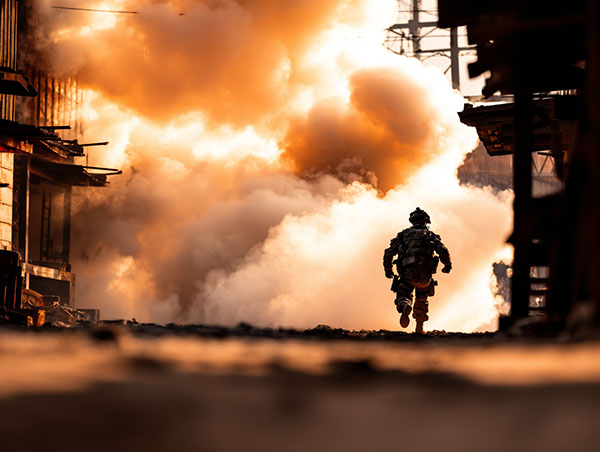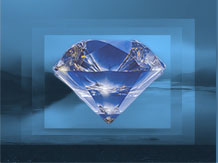Staying Awake
Finding a deeper response to conflict.
“When you call yourself an Indian or a Muslim or a Christian or a European, or anything else, you are being violent. Do you see why it is violent? Because you are separating yourself from the rest of mankind. When you separate yourself by belief, by nationality, by tradition, it breeds violence.”
J. Krishnamurti, Talks in the U.S.A. 1980, Talk 3, Ojai, California, 10 April 1980
Never has the world been more connected—through the digital networks that criss-cross our planet—and paradoxically, never more fragmented. We are becoming increasingly entrenched in fixed positions, where boundaries no longer connect but divide.
In our need to feel special, we craft personal identities in competition with everyone else—demanding recognition, defensively rejecting criticism. And this is only at the personal level. It expands exponentially across social, national, and global arenas.
Deep ideological, religious, and political positions are no longer seen as perspectives on a spectrum, but as existential battles for supremacy. The elimination of the other becomes the unspoken goal.
As individuals we are bombarded 24/7 with images of suffering, conflict, and division—a relentless kaleidoscope that floods our awareness. The instinct to respond can feel overwhelming.
And yet, something deeper calls. It invites us to see through the noise of reactivity to the roots of conflict within ourselves. To find a healing that goes beyond the personal, beyond identity, beyond opposition.
Some of us feel an innate sense of right and wrong, an ethical instinct that moves us toward justice. We feel the pull of empathy—the Good Samaritan impulse—to respond to suffering when we see it. This arises, I believe, from a deep well within us: our common humanity. Perhaps even from that deeper source still—the immanent divine, quietly emerging into form.
The question this essay explores is: What, in the end, is the most effective long-term response an individual or group can offer to a world in conflict?
Some take to the streets. They raise banners, chant slogans, speak truth to power. And this is needed. Power must feel the friction of dissent, even when it resists or punishes it.
But perhaps compassion can move in another direction too. A deeper one. Not instead of action, but as its root. Perhaps the greatest change begins not with confrontation, but with coherence—within our own hearts and psyches.
Maybe the world is crying out for a few of us (and it may only take a few pioneers to carve a new pathway)—not to withdraw, but to stand differently. To find something more resonant, more whole—and hold that together. Not alone, but in community. As a living experiment in transformation.
The moment we take sides, we divide ourselves. And this is the root of conflict. Beneath the surface, most of us live with an unresolved inner split—one we rarely examine. It is this unconscious division that drives much of our behaviour, giving it the appearance of righteousness, when it may be the echo of old conditioning.
It is widely accepted that personal liberation involves the acceptance of all parts of ourselves—the glorious and the shameful, the shadow and the light. Wholeness transcends fragmentation. But perhaps there is a deeper freedom still: one that invites healing not only at the personal level, but within the collective psyche we all share.
Can we see through the masks of separation—anger, aggression, identity, performance—to the divine spark at the centre of each of us?
I have been working with a group, and we have been exploring these questions not in theory, but through shared presence. (The story of its unfolding is told in The Space Between Us).
Meeting regularly within a subtle field of being—a space of intimacy beyond identity—we have discovered something surprising. Not only does this field embrace difference, it reveals difference as a bridge. A way back into harmony. What emerges is not uniformity, but a dynamic unity born of authenticity, integrity, honesty, and humility.
In our meetings, where our boundaries touch, they dissolve. Where perspectives meet and are held, a deeper intelligence reveals itself. Unity is not bland sameness. It is the dance of complexity held in coherence. The discovery of a ground of being—a living flow of vast natural intelligence that weaves fragmentation into a tapestry of belonging.
This ground, this field is not other than our intrinsic selves, supporting and enlightening us as we give ourselves and our lived experience back to it. As we surrender division and rest in what connects us, something new becomes possible: a polyphonic harmony that resounds with both majesty and radiant simplicity.
As Ilya Prigogine once proposed, perhaps small islands of coherence can act as catalysts—crystallising a new way of being that ripples through the wider collective. Perhaps it doesn't take everyone. Perhaps it begins with a few who dare to stand in coherence with something deeper than division.
J. Krishnamurti, Talks in the U.S.A. 1980, Talk 3, Ojai, California, 10 April 1980
Never has the world been more connected—through the digital networks that criss-cross our planet—and paradoxically, never more fragmented. We are becoming increasingly entrenched in fixed positions, where boundaries no longer connect but divide.
In our need to feel special, we craft personal identities in competition with everyone else—demanding recognition, defensively rejecting criticism. And this is only at the personal level. It expands exponentially across social, national, and global arenas.
Deep ideological, religious, and political positions are no longer seen as perspectives on a spectrum, but as existential battles for supremacy. The elimination of the other becomes the unspoken goal.
As individuals we are bombarded 24/7 with images of suffering, conflict, and division—a relentless kaleidoscope that floods our awareness. The instinct to respond can feel overwhelming.
And yet, something deeper calls. It invites us to see through the noise of reactivity to the roots of conflict within ourselves. To find a healing that goes beyond the personal, beyond identity, beyond opposition.
Some of us feel an innate sense of right and wrong, an ethical instinct that moves us toward justice. We feel the pull of empathy—the Good Samaritan impulse—to respond to suffering when we see it. This arises, I believe, from a deep well within us: our common humanity. Perhaps even from that deeper source still—the immanent divine, quietly emerging into form.
The question this essay explores is: What, in the end, is the most effective long-term response an individual or group can offer to a world in conflict?
Some take to the streets. They raise banners, chant slogans, speak truth to power. And this is needed. Power must feel the friction of dissent, even when it resists or punishes it.
But perhaps compassion can move in another direction too. A deeper one. Not instead of action, but as its root. Perhaps the greatest change begins not with confrontation, but with coherence—within our own hearts and psyches.
Maybe the world is crying out for a few of us (and it may only take a few pioneers to carve a new pathway)—not to withdraw, but to stand differently. To find something more resonant, more whole—and hold that together. Not alone, but in community. As a living experiment in transformation.
The moment we take sides, we divide ourselves. And this is the root of conflict. Beneath the surface, most of us live with an unresolved inner split—one we rarely examine. It is this unconscious division that drives much of our behaviour, giving it the appearance of righteousness, when it may be the echo of old conditioning.
It is widely accepted that personal liberation involves the acceptance of all parts of ourselves—the glorious and the shameful, the shadow and the light. Wholeness transcends fragmentation. But perhaps there is a deeper freedom still: one that invites healing not only at the personal level, but within the collective psyche we all share.
Can we see through the masks of separation—anger, aggression, identity, performance—to the divine spark at the centre of each of us?
I have been working with a group, and we have been exploring these questions not in theory, but through shared presence. (The story of its unfolding is told in The Space Between Us).
Meeting regularly within a subtle field of being—a space of intimacy beyond identity—we have discovered something surprising. Not only does this field embrace difference, it reveals difference as a bridge. A way back into harmony. What emerges is not uniformity, but a dynamic unity born of authenticity, integrity, honesty, and humility.
In our meetings, where our boundaries touch, they dissolve. Where perspectives meet and are held, a deeper intelligence reveals itself. Unity is not bland sameness. It is the dance of complexity held in coherence. The discovery of a ground of being—a living flow of vast natural intelligence that weaves fragmentation into a tapestry of belonging.
This ground, this field is not other than our intrinsic selves, supporting and enlightening us as we give ourselves and our lived experience back to it. As we surrender division and rest in what connects us, something new becomes possible: a polyphonic harmony that resounds with both majesty and radiant simplicity.
As Ilya Prigogine once proposed, perhaps small islands of coherence can act as catalysts—crystallising a new way of being that ripples through the wider collective. Perhaps it doesn't take everyone. Perhaps it begins with a few who dare to stand in coherence with something deeper than division.

The War Within
Sign up for updates, news, reflections, and poems, as well as occasional book or article recommendations from the edges of philosophy, mysticism, and consciousness. After signing up, you’ll receive a welcome email — please click the link to confirm your subscription (and check your spam folder if you don’t see it).

Newsletter Sign-Up
